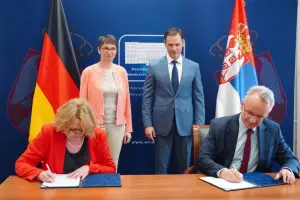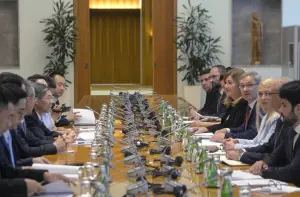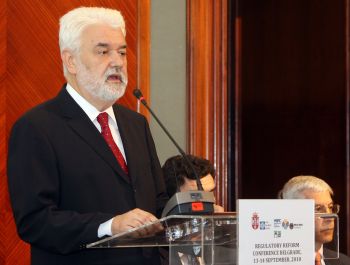- Serbia
Get to know Serbia
- Citizens
Culture and science
Health services
Pension and disability insurance
- Business
Employment
Economy
- Media
- Government
- Contact
Keep in touch
Contact form
Back
Keepin touch
Whether you have a question, comment, suggestion or any problem in the purview of the government, send us your message and we will try to respond as soon as possible. If your problem is not in our purview, we will forward your message to the relevant institution.
Q:
A:
Office for regulatory reform must be formed
Belgrade,
13 September 2010
Serbian Prime Minister Mirko Cvetkovic stated that to date the state has saved €60 million at an annual level through reforms of regulations aimed at facilitating business in Serbia, announcing that this amount will reach €180 million by the end of the year.
Speaking at a Conference on Regulatory Reform, organised by the Council for Regulatory Reform of the Business System, Cvetkovic announced the formation of an office for regulatory reform which will improve the analysis of proposals submitted by citizens and businesses with the aim of disburdening the economy.
The Prime Minister recalled that the Serbian government adopted a Regulatory Reform Strategy from 2008 until 2011, which implies not only the removal of unsynchronised administrative regulations, but also the strengthening of mechanisms for controlling new regulations.
He declared that considerable results have been achieved so far, noting the government’s intention to revoke all regulations that do not help economic development by the end of the year, as soon as it adopts a draft law.
The government does not see regulatory reform as a one-off task, Cvetkovic said recalling the results achieved so far, such as a new system for birth, death and marriage registers and one-counter system for submitting financial reports.
In a statement to the press following the opening of the conference, Cvetkovic voiced his expectation that Serbia’s candidacy for EU membership will be forwarded to the European Commission next month.
There are theoretical chances that this might happen today, but we believe it is still too early for this, the Prime Minister added.
The fact is that Serbia has the support of all 27 EU members, the Prime Minister stressed, explaining that one problem is the caretaker government in one country, which does not have the capacity to make decisions on such matters.
However, I do not expect this to be a serious obstacle, since the issue is merely a technical one, he added.
The conference was organised by the Serbian government, the World Bank, the International Financial Corporation, the World Bank Institute and the Balkan Centre for Regulatory Reform, with the support of the Swedish International Development Agency (SIDA).
The aim of the conference is to provide an insight into the results of regulatory reform in Serbia, with a special emphasis on the implementation of the Overall Regulations Reform and to propose guidelines for cooperation in this domain with other countries in the region.
It will also be an opportunity to share key international and regional experience which may help Serbia and other countries in the region to meet the challenges in this domain.
The Prime Minister recalled that the Serbian government adopted a Regulatory Reform Strategy from 2008 until 2011, which implies not only the removal of unsynchronised administrative regulations, but also the strengthening of mechanisms for controlling new regulations.
He declared that considerable results have been achieved so far, noting the government’s intention to revoke all regulations that do not help economic development by the end of the year, as soon as it adopts a draft law.
The government does not see regulatory reform as a one-off task, Cvetkovic said recalling the results achieved so far, such as a new system for birth, death and marriage registers and one-counter system for submitting financial reports.
In a statement to the press following the opening of the conference, Cvetkovic voiced his expectation that Serbia’s candidacy for EU membership will be forwarded to the European Commission next month.
There are theoretical chances that this might happen today, but we believe it is still too early for this, the Prime Minister added.
The fact is that Serbia has the support of all 27 EU members, the Prime Minister stressed, explaining that one problem is the caretaker government in one country, which does not have the capacity to make decisions on such matters.
However, I do not expect this to be a serious obstacle, since the issue is merely a technical one, he added.
The conference was organised by the Serbian government, the World Bank, the International Financial Corporation, the World Bank Institute and the Balkan Centre for Regulatory Reform, with the support of the Swedish International Development Agency (SIDA).
The aim of the conference is to provide an insight into the results of regulatory reform in Serbia, with a special emphasis on the implementation of the Overall Regulations Reform and to propose guidelines for cooperation in this domain with other countries in the region.
It will also be an opportunity to share key international and regional experience which may help Serbia and other countries in the region to meet the challenges in this domain.
-
 Požega, 5 July 2025
Požega, 5 July 2025Section of Pakovraće - Požega highway officially opened
-
 Belgrade, 2 July 2025
Belgrade, 2 July 2025Technical specifications defined for Serbia-Hungary oil pipeline
-
 Belgrade, 30 June 2025
Belgrade, 30 June 2025IMF confirms Serbia successfully implementing all agreed reforms
-
 Belgrade, 27 June 2025
Belgrade, 27 June 2025Double Taxation Avoidance Agreement with Germany signed
-
 Kostolac, 25 June 2025
Kostolac, 25 June 2025Construction of Kostolac wind farm nearing completion
-
 Belgrade, 24 June 2025
Belgrade, 24 June 2025Government supports request for new postponement of sanctions against NIS
-
 Belgrade, 23 June 2025
Belgrade, 23 June 2025Procedures to facilitate sale of Serbian products to China to be accelerated
-
 Belgrade, 21 June 2025
Belgrade, 21 June 2025Serbia receives first funds under Growth Plan for the Western Balkans
-
 Belgrade/Cairo, 20 June 2025
Belgrade/Cairo, 20 June 2025New phase in relations with Egypt in field of agriculture
-
 Belgrade/Athens, 18 June 2025
Belgrade/Athens, 18 June 2025Serbia’s leadership position in power sector


